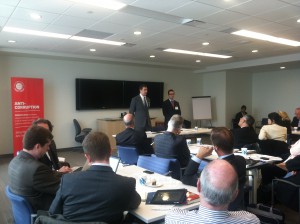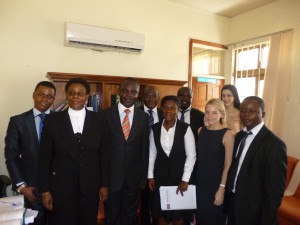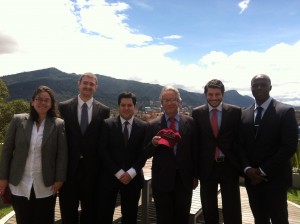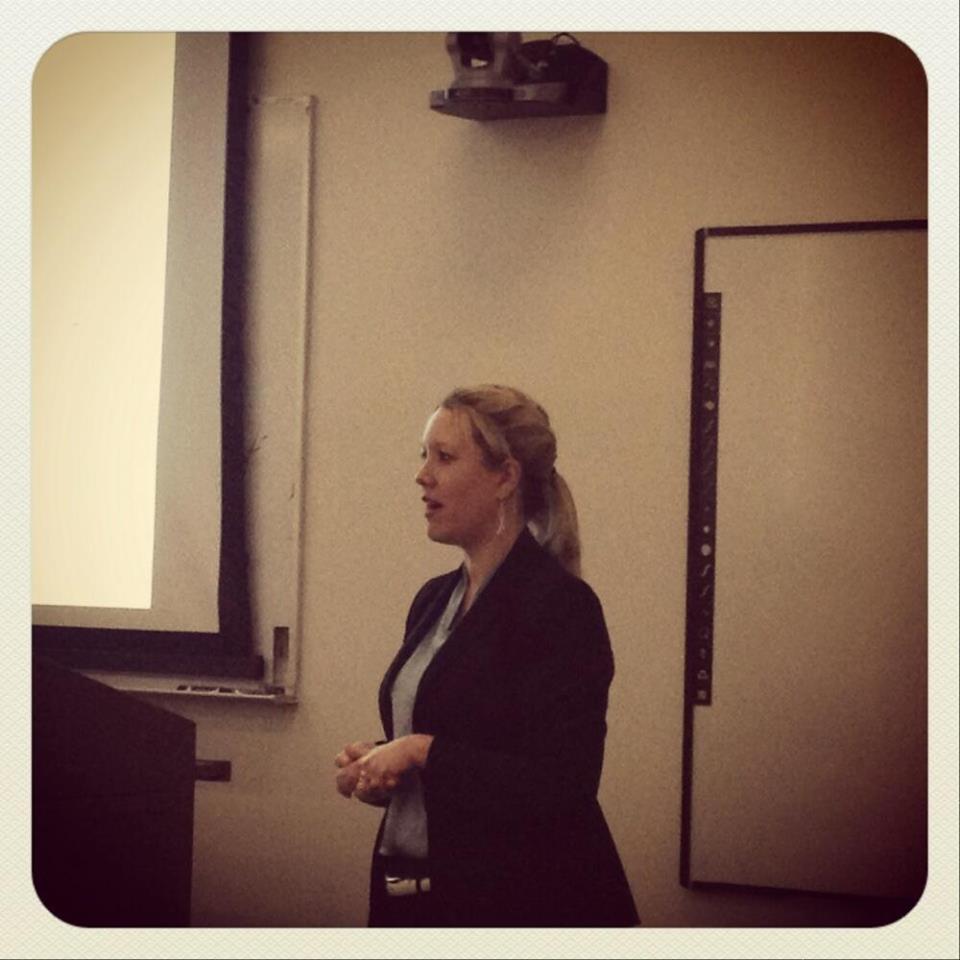

Corporate Social Responsibility Program
Efforts to advance corporate social responsibility are vital to the Leitner Center’s mission to promote social justice around the world. Human rights, labor rights, the environment and anti-corruption efforts are impacted by almost every aspect of corporate activity from to the treatment of employees, to the impact of products and services on consumers and society, to the use of natural resources, to the disposal of waste products, to corporate relationships with communities, shareholders and government.
In February 2012, following a generous gift from PVH Corp., the Leitner Center launched a new Corporate Social Responsibility Program. Through education, research, project work and speaker events, the Program examines the challenges and opportunities present for companies and stakeholders as they strive to improve their social and environmental footprint and develop sustainable business practices. The Program is one of the first of its kind at US law schools and provides a unique learning opportunity for students at Fordham. Highlights of the CSR Program include:
Corporate Social Responsibility Clinic
Directed by Professor Paolo Galizzi with the support of Senior Fellow Emily Smith Ewing, the Clinic introduces students to the law and practice of corporate social responsibility. A weekly seminar explores CSR in different regions around the world, and has hosted notable guest speakers from PVH Corp., Goldman Sachs, the United Nations, Social Accountability International, Shift Project and trade unions, among others, on current initiatives and developments in the field. The Clinic also offers students the opportunity to understand these issues first hand through practical, real-life projects with business and NGO partners. Projects to date include:
 United Nations Global Compact Anti-Corruption Report: In the fall 2012, a group of students worked with the United Nations Global Compact (UNGC) to research and report on trends in anti-corruption reporting by UNGC business participants. Member companies submit annual reports to the UNGC in the areas of human rights, labor rights, the environment and anti-corruption, which together make up the ten UNGC principles. The students analyzed the reporting behavior and trends of 80 member companies and were invited to present their findings and suggestions at a Working Group Meeting on Anti-Corruption in December 2012.
United Nations Global Compact Anti-Corruption Report: In the fall 2012, a group of students worked with the United Nations Global Compact (UNGC) to research and report on trends in anti-corruption reporting by UNGC business participants. Member companies submit annual reports to the UNGC in the areas of human rights, labor rights, the environment and anti-corruption, which together make up the ten UNGC principles. The students analyzed the reporting behavior and trends of 80 member companies and were invited to present their findings and suggestions at a Working Group Meeting on Anti-Corruption in December 2012.
Human Rights Fact Sheets in High Risk Countries: Partnering with a multinational corporation with a supply chain spanning over 60 countries across the globe, students developed human rights fact sheets on a number of high risk countries in which the company operates. The reports outline local human rights law and identify gaps between local law and international labor standards. The reports also highlight examples of best practices and case studies of company or industry initiatives driving positive impact in the different regions.
Human Rights Risks of Investment in Myanmar: Through a partnership with the Institute for Human Rights and Business (IHRB), students are working on a project to assist with the mapping of human rights impact risks in connection with rapidly growing investment in Myanmar. In particular, students are researching risks related to Myanmar’s growing market for information and communications technology (ICT), including risks related to infringement of privacy rights, freedom of expression, and access to information.
Civic education program for primary schools in Rwanda: Following a generous gift from a US-based power company, students are developing a civics and human rights education program for school-aged children in Rwanda. Coming up on the 20-year anniversary of the devastating 1994 genocide, the aim of the program is contribute to ongoing efforts to promote understanding and respect for democracy, human rights and the rule of law in Rwanda, by weaving these values into age-appropriate curricula for children of various school ages. This project partners Fordham students with law students in Rwanda to develop a simple yet empowering curriculum which will cover the principles and practical aspects of citizenship, as well as a basic introduction to fundamental human rights, with a focus on children’s rights and gender equality, in particular. 
Company Human Rights Policies: Following the unanimous endorsement of the Guiding Principles for Business and Human Rights by the United Nations Human Rights Council in June 2011, there is growing acknowledgement of the expectation for businesses to respect human rights. To demonstrate commitment to this responsibility, the Guiding Principles propose that companies adopt a human rights policy. Setting out the legal, financial and ethical reasons for adopting a Human Rights Policy, students produced a report and sample policies for consideration by a multinational corporation.
Report on Consumer Purchasing Behavior: Considering the relationship between CSR and profits, students conducted research into the purchasing behavior of consumers in response to corporate citizenship initiatives. The report also compared the CSR efforts of a number of companies within the same industry.
CSR and Lawyers Global Project
 Exploring the social responsibility of lawyers to provide free legal services to the poor and underserved, the CSR Program has established a new CSR and Lawyers Global Project. Partnering with local law students and NGOs, the Project examines current pro bono efforts in selected countries and presents proposals for future reform and expansion. The Project commenced its work in 2012 in Colombia and has since traveled to Ghana in March 2013. The Project has been invited to conduct similar research projects in other countries in Latin America in 2014.
Exploring the social responsibility of lawyers to provide free legal services to the poor and underserved, the CSR Program has established a new CSR and Lawyers Global Project. Partnering with local law students and NGOs, the Project examines current pro bono efforts in selected countries and presents proposals for future reform and expansion. The Project commenced its work in 2012 in Colombia and has since traveled to Ghana in March 2013. The Project has been invited to conduct similar research projects in other countries in Latin America in 2014.
PVH Sustainable Enterprise Speaker Series
A lunchtime CSR speaker series has hosted a number of distinguished speakers on the myriad aspects of business, human rights and the environment. Experts from the United Nations Global Compact, the American Bar Association Human Rights Center, Institute for Human Rights and Business, Earth Rights International and PVH Corp. have spoken on the most recent developments and challenges in the field. Further speakers will be announced in due course.
CSR Leadership Course
A new Leadership Course has been designed to educate companies and lawyers on the expanding legal obligations in the field of CSR and will introduce them to the instruments and mechanisms in place to help navigate this challenging terrain. Through panel discussions, expert lecturers, case studies and group projects, participants will work alongside peers and business leaders to share experiences and discuss the role that the business sector can and should play in the advancement of human rights. The Program held its inaugural CSR Leadership Course on June 2-4, 2014. More information about the 2016 CSR Leadership Course can be found on the course website.
To find out more about the Corporate Social Responsibility Program please contact:
Emily Smith Ewing, Senior Fellow in Corporate Social Responsibility





